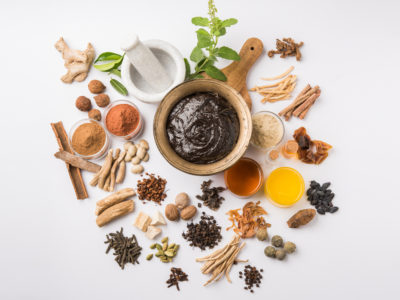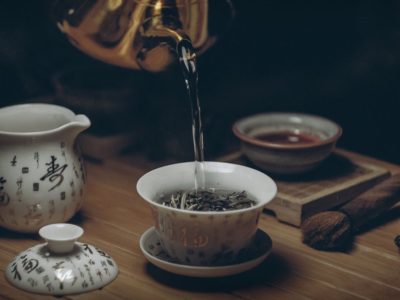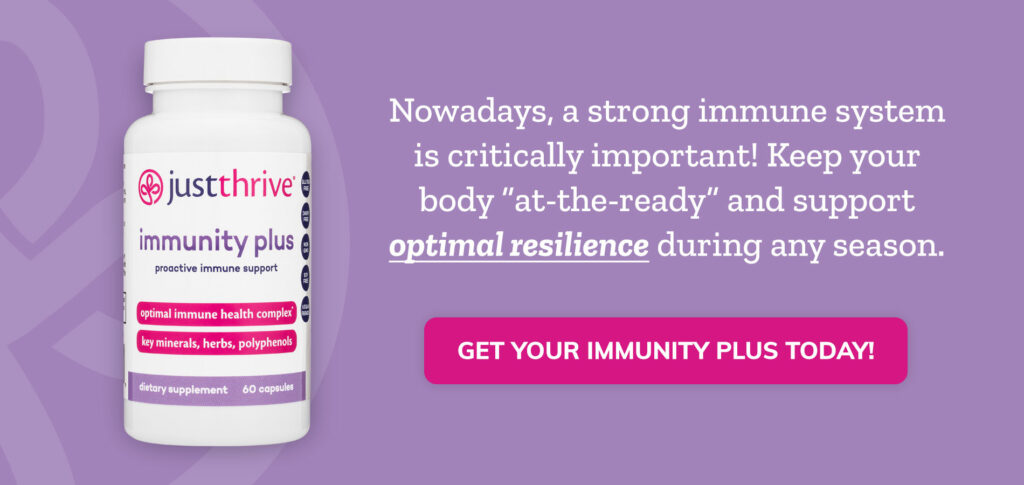Table of Contents[Hide][Show]
If you’ve been listening to podcasts, searching around the supplement world, or following any “health influencers” the last few years, you’ve probably come across the word “adaptogen.” But what are adaptogens really?
Beyond the word sounding super cool, are adaptogens actually something you should consider adding into your health regimen?
Unfortunately, many online sources that focus on information about adaptogens do little and less to make the world of adaptogens easy to understand.
Let’s change that today by answering some of the most common adaptogen questions: what they are, what they do, the pros and cons, and more.
What Are Adaptogens? Are They Herbs?
They are called adaptogens because of their unique ability to “adapt” their function according to the specific needs of the body and the different types of stress.
For example, you may encounter physical, chemical, or biological stressors, and adaptogens are purported to help combat them all.
Adaptogens can be derived from herbs, seeds, fruits, roots, or mushrooms, and there are over 70 acknowledged and named adaptogens—many of which need more research to determine their specific benefits or risks.
On top of that, it’s suspected that each adaptogen is extremely unique in its benefits and properties, so the work of thoroughly studying each individual variation has been slow.
This is probably a major reason why the mainstream discussion of adaptogens didn’t come around until fairly recently…but these substances have actually been known in the scientific community for much longer than you might think.
The word “adaptogen” itself has been used for over 80 years, and was coined in 1940 by a Russian scientist.
And there are several well-known adaptogens that, even before science officially coined the term, have been used for thousands of years for health benefits.
List of Common Adaptogens & Adaptogenic Herbs
With 70 discovered adaptogens out there (and who knows how many more yet to be discovered) here is a compilation of the most common ones you might see at a store or in an herbal supplement or tincture.
Popular adaptogens include:
- Ginseng
- Ashwagandha
- Rhodiola
- Cordyceps
- Reishi
- Holy Basil
- Goji berry
- Licorice root
- Maca
- Turmeric
- Tulsi
- Indian gooseberry
- Elderberry
- Saw Palmetto
- Eleuthero
- Shatavari
- Shilajit
- Ho Shou Wu
- Pearl
- Aloe vera
- Andrographis paniculata (creat)
- Bilberry
- Jiaogulan
- Schisandra
- Suma
- Valerian
While the Western medical research is still catching up to clarify how each of these plants or fungi helps with health, many of the items above have been used in Eastern and Ayurvedic medicine for thousands of years.
Whether it’s immune support, reducing mental stress, improving sleep, increasing fertility, or helping with athletic performance, certain adaptogens have been a longstanding, go-to component of herbal medicine in many parts of the world.
Related
Best 5 Ayurvedic Herbs For Acne That Really Work
Is acne giving you trouble and none of the regular treatments work? Learn how Ayurveda herbs for acne have been healing skin problems years.
What Are the Benefits of Taking Adaptogens?
These specialized plants have been used to improve health and well-being for the last few millennia in certain cultures, but is there research that can actually back up any of the health claims?
Let’s get into some specific benefits that do have strong research behind them, as well as what adaptogens can help you on your path to better health and wellness.
A massive study published in Chinese Medicine by Liao et. al. dives into a number of these, including…
Healing Adrenal Fatigue
When we talk about our body’s stress response, we often don’t think about its long-term impact.
But the adrenals—the tiny glands located on top of your kidneys that are part of the endocrine system and produce your norepinephrine—can become overwhelmed.
And when the adrenals become damaged from over-use, it’s similar to when someone develops Type 2 Diabetes:
The adrenals pump out norepinephrine in response to the high cortisol and epinephrine levels in someone who is over-stressed… The body quits responding to these high levels of norepinephrine… As a result, the adrenal glands pump out even more.
Eventually, a sort of “norepinephrine resistance” is developed, and this is what is known as “adrenal fatigue.”
This norepinephrine resistance can cause a whole stress-related cascade of health detriments, starting with hormonal imbalances that can cause weight gain, fatigue, brain fog, thyroid problems, and more.
Certain adaptogens associated with healing adrenal fatigue include:
- Ginseng
- Ashwagandha
- Maca
- Holy Basil
- Mucuna pruriens
- Licorice root
- Rhodiola
- Schisandra
- Eleuthero (aka eleutherococcus or Siberian ginseng)
Improving Sleep
As we’ve already covered, the biggest known benefit of taking any adaptogens is that they can help the body better combat stress.
The hormone cortisol is the body’s biggest stress hormone, and it’s also the one most associated with negative health effects such as weight gain, poor sleep, declining mental health, and hormonal imbalances in other parts of the body.
Anything associated with helping the body to better manage stress and cortisol is likely to help improve your sleep, because cortisol inhibits sleep.
In turn, quality sleep can also help you to reduce your cortisol levels. But if cortisol production is working against your sleep, it becomes a negative feedback loop.
So, since all adaptogens seem to assist in stress relief, it can be implied that any adaptogen could help you get better quality sleep.
But the adaptogens most commonly used to help with sleep quality include:
- Ashwagandha
- Ginseng
- Schisandra
- Valerian
- Rhodiola
Immune System Support
Another huge benefit of adaptogens is their ability to help support the immune system.
This is probably the most common way you’ll see them advertised; elderberry is notoriously found in many holistic products sold to help when you’re sick or to simply keep you healthy.
And the good news for this supposed benefit is that there is plenty of research to back it up.
A peer-reviewed study in Pharmaceuticals showed strong evidence that each of these adaptogens can be used for immune support:
- Ashwagandha
- Eleuthero
- Schisandra
- Ginseng
- Rhodiola
- Creat
- Licorice (and really, the whole Glycyrrhiza plant family)
Some of the specific immunity benefits highlighted in the study were virus inhibition, anti-inflammatory activity, activation of natural killer cells, and antioxidant production.
Adaptogens found in other studies to improve immunity include:
- Cordyceps
- Holy Basil
- Astragalus
An interesting thing to note is that the research on adaptogens and immunity is so robust, we even understand the way that these adaptogens help protect against sickness.
Adaptogens work to help strengthen the immune cells we already have while promoting the production of new, natural killer (NK) cells.
This means that it helps the body overall against any possible invader.
Hormonal Protection + Boosting
Some adaptogens are known to help balance hormones, and that works through the overall strengthening of the neuroendocrine system.
Interestingly the hormonal benefits of adaptogens seem to stem from sex hormone improvement.
For example, one study found that ashwagandha taken for 16 weeks resulted in a 14.7% increase in testosterone in aging men.
Another study on saw palmetto showed that it could be used to prevent “andropause,” also known as the “male menopause” that men experience around age 50.
Saw palmetto is also widely used to help men increase their testosterone levels so that they can prevent hair loss and boost prostate health.
Related
16 Best Herbs for Hair Growth at Home
Give your scalp the nutrients it needs to grow gorgeous tresses with these 16 best herbs for hair growth.
This testosterone + prostate boost can have many positive health effects beyond the bedroom, too: increased testosterone in men can result in higher energy levels, better mood, better athletic performance, and improved focus.
And in women, saw palmetto can also be used for a hair loss treatment.
It offers women similar testosterone support, but it’s not a boost in levels. For women, saw palmetto balances their testosterone levels bring them back to a normal level, more aligned with their other sex hormones.
Beyond these health benefits, several adaptogens are known aphrodisiacs and can be used to boost libido.
Adaptogens that have been shown to boost libido and improve sex hormones include:
- Maca
- Ho Shou Wu
- Shilajit
- Ashwagandha
- Schisandra
- Saw Palmetto
Reducing Arthritis Symptoms
The anti-inflammatory benefits of adaptogens really can’t be under-stated.
Reducing inflammation across the body—as adaptogens have been shown to do—can help improve the symptoms of many conditions, especially autoimmune diseases. This is why anti-inflammatory diets are often recommended to those with autoimmune disease.
For an inflammatory condition like arthritis, adaptogens are shown to significantly reduce pain from both osteoarthritis and rheumatoid arthritis, as well as fibromyalgia.
Some adaptogens shown to aid in this pain reduction include:
- Ginseng
- Turmeric
- Reishi
- Rhodiola
- Licorice
Tumor and Cancer Prevention
Prevention of cancer and blocking of certain tumor functions is a major benefit of certain adaptogens.
When it comes to blocking tumor growth, ashwagandha and rhodiola are highlighted to help promote apoptosis (cell death) in unhealthy cells, preventing them from turning into cancerous or tumor cells.
For people going through cancer treatment, ginseng, ashwagandha, rhodiola, and maca have all been shown to help those currently fighting the disease.
They can boost the body’s base immunity to aid the fight, increase blood cell count to reduce infection, and increase the effects of chemo drugs on cancerous cells while protecting the body’s healthy cells.
Adaptogens also aid the fight against cancer by reducing the body’s overall stress level, preventing the chances of cancerous tumor metastasis.
Ginseng in particular has also been shown to prevent multi-drug resistance by blocking the pathway cancer cells use to mutate against Western chemo treatments.
And as for the prevention of cancer, adaptogens can also provide support by blocking the production of cancer cells, preventing tumor growth, and promoting cellular repair.
Adaptogens for cancer prevention and treatment support include:
- Ginseng
- Ashwagandha
- Rhodiola
- Maca
Side Effects of Adaptogens
A common thread of advice when it comes to adaptogens is to rotate your usage every 6 months or so.
This is because the long term effects of adaptogens have not been heavily researched, and there does seem to be a positive effect of “rotating” them every so often.
The side effects of adaptogens seem to be relatively light, if there are any at all.
Possible adaptogen side effects include:
- Mental stimulation
- Gastrointestinal stress
- Diarrhea
- Vomiting
- Drowsiness
- Increased blood pressure
The first categoric side effect of adaptogens that is mentioned the most is mental stimulation. For some people, this is an added benefit; many people use adaptogens for the enhanced cognitive function and mental performance they experience when using them.
Also keep in mind that the negative side effects have not been heavily reported.
More than anything, it’s worth it to make sure that what you choose to take will not interact with anything else you’re taking and to pay attention to possible food sensitivities that could be triggered.
When in doubt, ask your doctor!
So, Should You Take Adaptogens?
Like any supplement or health choice, it’s up to you to decide if or how adaptogens can best work for you.
There is still plenty of research to be done on many of the adaptogens mentioned today.
However, there is some really good evidence that the most commonly used adaptogens can provide some great health benefits for those who use them properly.
If you choose to try them, make sure to do your research on quality and dosage…and track any changes you notice for yourself!
You May Also Like…






